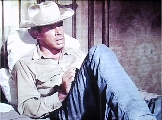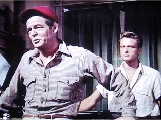Bad Day At Black Rock (1954) dir. John Sturges writ. Millard Kaufman (based on the story by Howard Breslin) cine. William C. Mellor edt. Newell P. Kimlin music. Andre Previn star. Spencer Tracy (John McCready), Robert Ryan (Reno Smith), Anne Francis (Liz Wirth), John Ericson (Pete Wirth), Ernest Borgnine (Coley Trimble), Lee Marvin (Hector David), Dean Jagger (the Sheriff), Walter Brennan (Doc), Russell Collins (Telegraph man)
Cinemascope in Eastman Color
This is a western by any other name, although if it was in black and white it could be considered film noir. The one-arm stranger arrives in town, not on a horse or in a stage coach, but on the big art deco diesel train, The Streamliner, which makes an unscheduled stop just for the occasion. Black Rock is a one-horse town lost in a time-warp, extending at right-angles from the tracks which, in the omniscient aerial shot, seem to extend across the harsh beauty of the Arizona desert into a wall of forbidding mountains. It's a world of rocks alright and the town could be a ghost town, except for its cast of xenophobes who carry on as if this is 1865, not 1945.
 This excellent drama exploits
not only the expressionism of the natural surroundings but also the structural
method of stage drama. The characters move and talk as caricatures in
scenes that have the mannered exposition of live theatre. The effect is eerie,
a theatre of menace, where the mystery of who and why they are compels us to
keep watching.
This excellent drama exploits
not only the expressionism of the natural surroundings but also the structural
method of stage drama. The characters move and talk as caricatures in
scenes that have the mannered exposition of live theatre. The effect is eerie,
a theatre of menace, where the mystery of who and why they are compels us to
keep watching.
Ever seen The Petrified Forest? Also set in Arizona, this film's protagonist is a wandering poet who meets his nemesis in the Depression-era gangster Duke Mantee, a modern desperado rediscovering the Old West... or is it the New West discovering an old desperado? In Bad Day At Black Rock, you can see a similar character and conflict in the tribulations of the taciturn stranger (Spencer Tracy) as he faces off against the despotic rancher Reno Smith (Robert Ryan) and his entourage of criminal lackeys. If The Petrified Forest foresees the catastrophe of the Second World War, then Black Rock is the paranoid result.
The idea of having McCready -- the Stranger -- dressed in a black suit and missing an arm is fabulous. He's a man who moves with integrity and purpose, is easily mistaken as a federal officer for some mysterious moral agency. You learn late in the drama that he lost his arm during combat in Italy... and that his life was saved by a Japanese American who was himself killed. McCready has come to Black Rock to try and find the dead soldier's father who is apparently homesteading at a place called Adobe Flats. McCready's affliction is a universal affliction, not only as personal metaphor but also one that represents all Americans who experienced the tragedy of the war. Thus McCready's journey to find his saviour's father becomes a spiritual journey to recover an obscured American value.



Black Rock is a long way from Hawaii, yet the shadow of Pearl Harbor hangs over it like the trauma of the Alamo. The rancher Reno Smith is a man driven with the bitterness of a failed patriot. Rejected by the induction board in 1941, he decides to serve his country by the usual method, vigilantism. He wants to kill a Jap -- and any Jap will do. The fact that his brutal altruism masks a personal agenda is, naturally, typical of the fascist reflex. Thus the town is a town of the living dead, peopled by puppets of this moral weakling who has forgotten the basic tenants of the Constitution. The Sheriff (Dean Jagger) is a drunk, so broken by Smith's control and desert claustrophobia that he hides all day in his jail cell with a bottle. But they're not all cowards. Although he says "I'm consumed with apathy", the only person who in any way disputes Smith's tyranny is the fatalistic Doc (Walter Brennan), the town undertaker.


The heavies are marvellous. Everywhere McCready turns, he is met by suspicion and hostility. When he checks into the hotel (with difficulty), takes a bath, he comes back into his room to find Hector (Lee Marvin), the long lanky lout lying on his bed, toothpick rolling, stetson tipped forward shading his malevolent eyes. "This room is for us cowboys for our every wish and comfort," says Hector. "When we're in town... and as any fool can see, I'm in town."
When McCready drives to Adobe Flats, discovers the homestead is a scorched ruin, Coley (Ernest Borgnine) runs him off the road. When he returns to town, tries to get something to eat in the diner, Coley picks a fight with him -- and this isn't easy, as McCready goes out of his way to always to turn the other cheek. McCready doesn't pack a gun, but his one good hand is a lethal chopping device, the last weapon of the old soldier trained in hand-to-hand.
Does a shallow grave reveal itself with a shadow of wild flowers? Is a pretty young girl immune to death? There are a number of surprises along the way. In his Nine Points for writing a play, Strindberg lists "the secret" that is known to the characters but withheld from the audience -- this is the primary technique used for driving the action in Black Rock. While the town has its secret, the Stranger also has his.
Yet this film is not only interesting because of its archetypal setting, humanist politics, juxtaposing tensions, and symbolist overtones, but also because of its excellent cast. You marvel at the ease with which a mature Spencer Tracy handles his role, and at the exciting innuendo acting of Lee Marvin and Ernest Borgnine, still early in their careers. Walter Brennan is first-rate as an idealist masquerading as a cynic, while Robert Ryan is as lean and mean as the desert flats he apparently owns.
© LR 6/2000